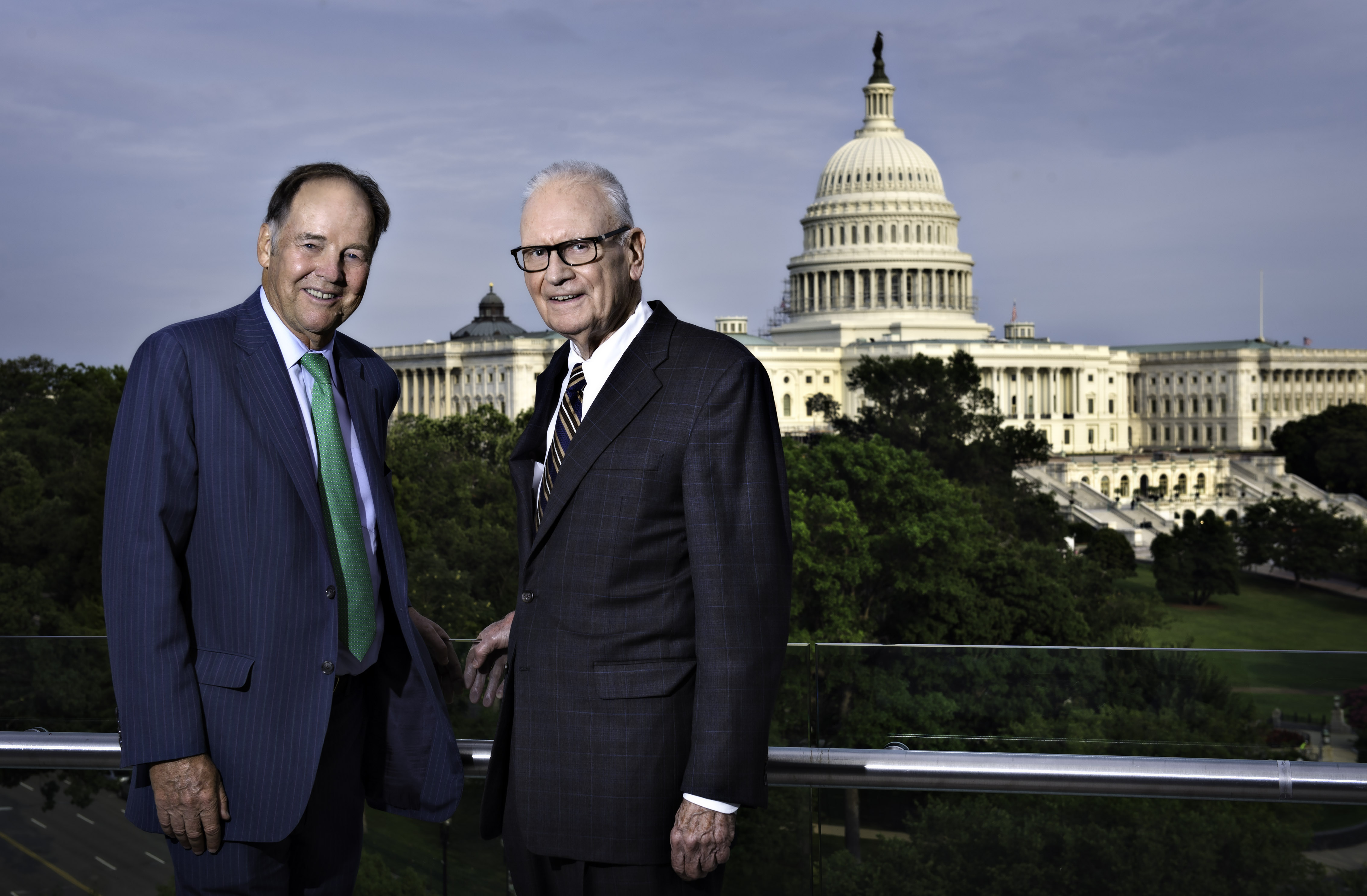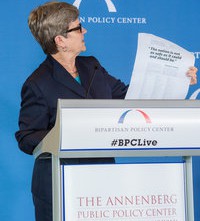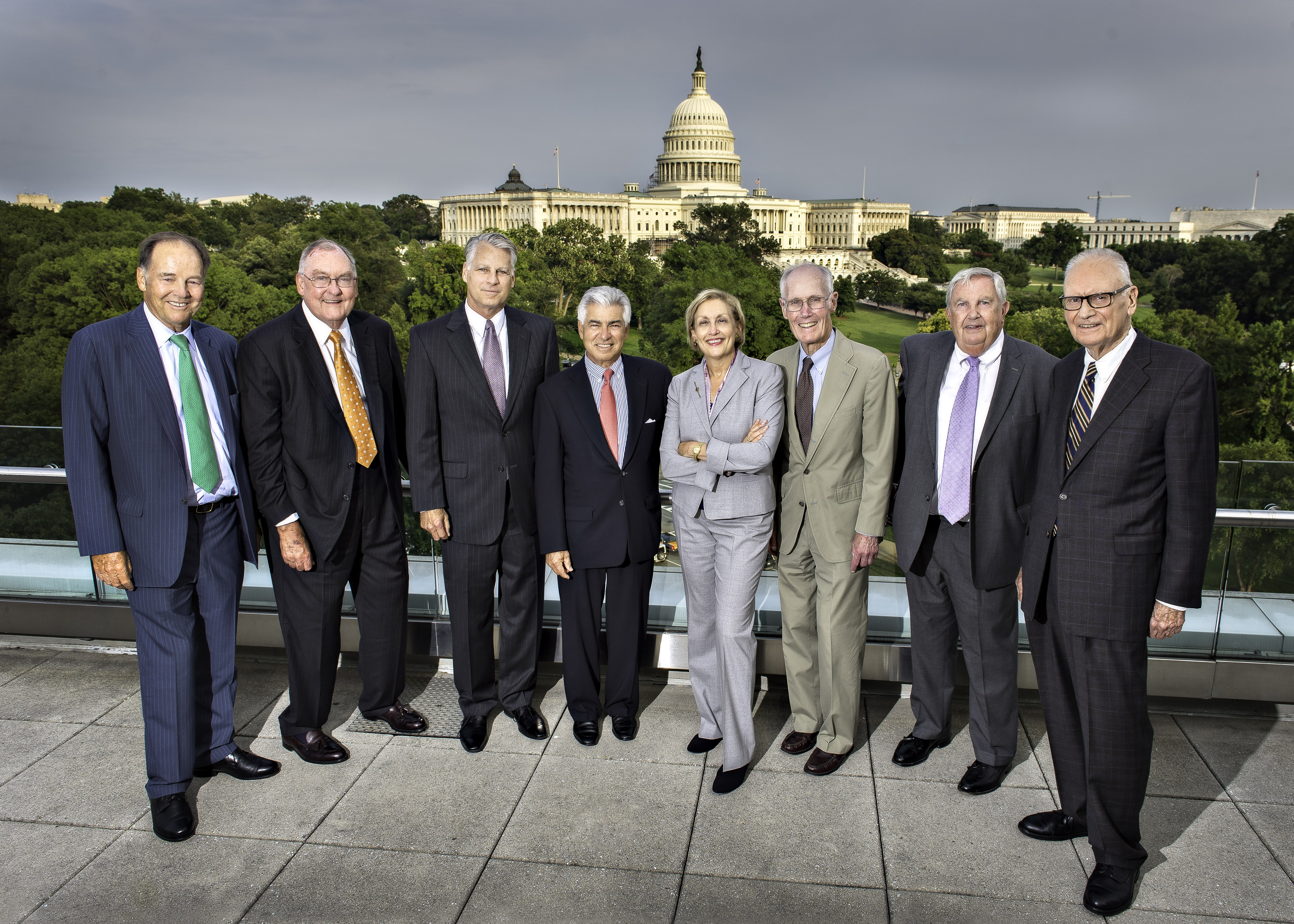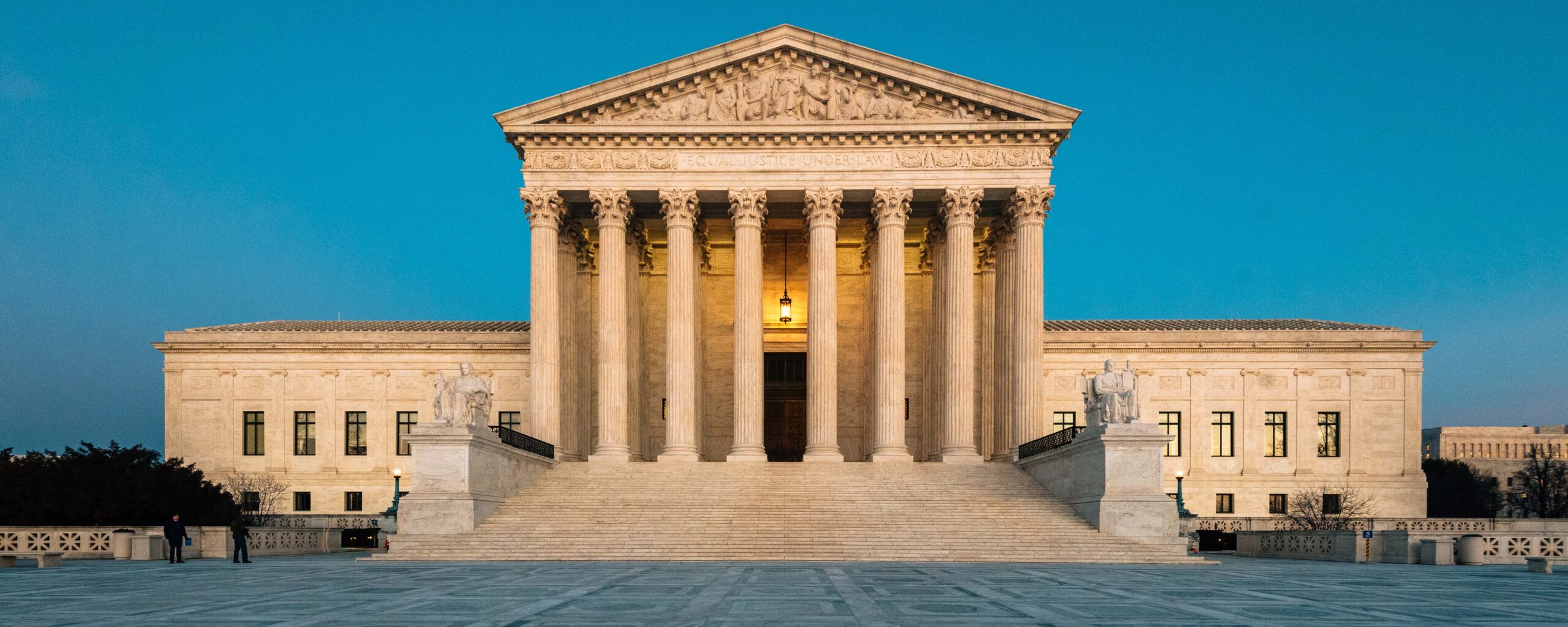The struggle against terrorism “has entered a new and dangerous phase,” the members of the 9/11 Commission said in a report issued on July 22, 2014, the 10-year anniversary of the original 9/11 Commission Report, at a news conference and symposium in Washington, D.C.
Spearheaded by the Bipartisan Policy Center in partnership with the Annenberg Public Policy Center (APPC), the new report identified emerging threats and continuing U.S. security vulnerabilities. One of the major problems, said the 10 members of the 9/11 Commission, was Congress’s failure to streamline the oversight of the Department of Homeland Security — the only major recommendation from their original report that has not been acted upon.
When the commission made its original recommendation in 2004, the Department of Homeland Security reported to 88 Congressional committees and subcommittees. By the last Congress, the department answered to 92, along with another 27 caucuses, commissions and groups.

The new report, titled “Today’s Rising Terrorist Threat and the Danger to the United States: Reflections on the Tenth Anniversary of the 9/11 Commission Report,” highlighted the need to simplify oversight along with a series of other threats, including:
- The rise of ISIS, the Islamic State of Iraq and Syria, an extremist group that has killed thousands and conquered parts of Western Iraq and Syria, creating a breeding ground for terrorism.
- The danger posed by foreign fighters returning to the United States and Western Europe from Syria and Iraq who may bring their extremist ideology home.
- The need for improved cyber-readiness. As one former intelligence agency said, “We are at September 10th in terms of cyber preparedness.”
- Concerns that Americans have a waning sense of urgency about the struggle against terrorism.
Streamlining the oversight of the Department of Homeland Security has been endorsed by a wide range of experts on the left and the right. In May, more than 60 authorities — including the 9/11 Commission, the three past Secretaries of Homeland Security, and former heads of the FBI, CIA, NSA and the Joint Chiefs — signed on to a full-page ad, created by the Annenberg Public Policy Center, that ran in the Wall Street Journal. The need for reform was also endorsed by the Sunnylands-Aspen Task Force, a bipartisan group of experts organized in 2013 by APPC, the Aspen Institute Justice & Society Program, and the Annenberg Retreat at Sunnylands in 2013. The group’s report is here.
A graphic illustrating the problem ran in the New York Times on Sunday, July 20. More about the ad, which was sponsored by APPC in partnership with the Aspen Institute Justice & Society Program, can be found here or at www.annenbergpublicpolicycenter.org/security.
In the Washington BPC-APPC event on July 22, APPC director Kathleen Hall Jamieson introduced a panel on DHS oversight. Former Homeland Security Secretary Tom Ridge said the issue wasn’t just an organizational problem for Congress. “We’re simply saying to the leaders: It’s a national security issue, deal with it in an effective way, and that is changing the jurisdiction” of the committees overseeing it,” Ridge said. He told the audience, “My plea today isn’t to you, but to the leadership of the House and Senate to do something with regard to the massive, inefficient, ineffective oversight procedures dealing with the Department of Homeland Security.”

Former 9/11 Commission vice-chairman Lee Hamilton said the oversight “continues to be dysfunctional… episodic, inadequate and threatens our national security.” Added former Commission member Timothy Roemer: “We hear Congress talk all the time about waste, fraud and abuse, waste fraud and abuse, how bad that is. Here is a great example of waste, fraud, and abuse, and how Congress could do it better.”
The 9/11 Commission event was followed on Wednesday by a hearing before the House Homeland Security Committee, whose chairman, Michael McCaul (R-TX), cited the oversight graphic published by APPC. “When you have the [DHS] Secretary having to report to almost a hundred committees and subcommittees in Congress, Congress has not done its job…. This is dysfunction,” he added. “If you looked in the dictionary and looked under dysfunctional, you would probably see this map.” Homeland Security Secretary Jeh Johnson remarked on the same graphic during an interview at the Aspen Security Forum, in Aspen, Colorado, on July 24. “There’s a point where oversight is too much,” Johnson said. “It definitely takes away from the mission that I know the taxpayers and Congress want us to be focused on.”
In the House committee hearing, 9/11 Commission chairman Gov. Thomas Kean testified, “People have got to understand that dysfunctional oversight makes the people of this country less safe. That it impedes the department in doing its job. … We’ve had four Secretaries now in the department, two Republicans and two Democrats, all four of them have told me personally and told our group, nothing is more important than changing this, and trying to get the oversight right.”
News coverage on this issue includes:
- Keller @ Large: Why Can’t Congress Learn From Its Mistake? (CBS Boston, July 24, 2014)
- 9/11 Commission a decade later: ‘Terrorism is not going away (CNN, July 23, 2014)
- 9/11 Commission Warns US Unprepared For A Possible ‘Cyber-Pearl Harbor’ (The Daily Caller, July 23, 2014)
- It’s grim: 911 Commission warns terrorism has entered ‘a new and dangerous phase’ (The Washington Times, July 23, 2014)
- The 9/11 Commission Is Back With a New Warning for America (The Daily Beast, July 23, 2014)
- 9/11 Commission Back with Warning: Terrorists Are ‘Returning to Attack Us’ (Mediaite, July 23, 2014)
- 9/11 Commission Chair: Congress Is the Biggest Obstacle to Stopping the Next Terrorist Attack (National Journal, July 23, 2014)
- 10 years later, 9/11 Commission issues update (MSNBC, July 23, 2014)
- 9/11 Commission’s New Cyberthreat Focus (Bank Info Security, July 23, 2014)
- National Commission on Terrorist Attacks Report 10th Anniversary (C-SPAN, July 22, 2014)
- Commission releases updated list of post 9/11 concerns (WTOP, July 22, 2014)
- 9/11 Commission Alumni Warn of Unfinished Business Combatting Terrorism (Government Executive, July 22, 2014)
- ‘History may be repeating itself’ in cyberspace (FCW, July 22, 2014)
- Significant national security challenges remain 10 years after 9/11 commission report (FedScoop, July 22, 2014)
- 9/11 Commission Returns, Warns Of New Terrorist Threats, Congressional Chaos (Inquisitr, July 22, 2014)
- Your Tuesday Briefing: Lessons learned. (The New York Times, July 22, 2014)
- 9/11 Commission Members Acknowledge Historic Dangers of Arming Rebels in Mideast (RIA Novosti (Russia), July 22, 2014)
- Govt bureaucracy undermining US war on terror – report (RT, July 22, 2014)
- 9/11 commission issues new report on growing threats to US (Fox News, July 22, 2014)
- America is still vulnerable to terrorism as Al Qaeda-affiliated groups grow and turn to cyber attacks: study (New York Daily News, July 22, 2014)
- Tom Kean: Cybertheft Is New Focus of Terror Threat (Newsmax, July 22, 2014)
- 9/11 Commission: Americans can’t be complacent about new security threats (PBS NewsHour, July 22, 2014)
- 9/11 panel chairs slam Hill ‘dysfunction’ (Politico, July 22, 2014)
- 9/11 Commission Report A Decade Later: Threats Have Evolved, U.S. Hasn’t (Huffington Post, July 22, 2014)
- 9/11 Commissioners’ New Warning (Politico (Playbook), July 22, 2014)
- Chairs of 9/11 panel slam Hill ‘dysfunction’ (Politico (Morning Defense), July 22, 2014)
- 9/11 panel: Terrorism fight is in ‘new and dangerous phase’ (USA Today, July 22, 2014)
- US has counterterrorism fatigue (Al Jazeera America, July 22, 2014)
- Scoop: New life for NCCIP – Seleznev arrest latest – Does cyber undermine global stability? (Politico (Morning Cybersecurity), July 22, 2014)
- New 9/11 Report Urges Cybersecurity Legislation (Broadcasting & Cable, July 22, 2014)
- 9/11 Commission chiefs: “America cannot afford to let down its guard” (CBS News, July 22, 2014)
- ‘The struggle against terrorism is far from over’: 9/11 Commission Report authors release 10th anniversary study (New York Daily News, July 22, 2014)
- Intelligence community coping with a ‘perfect storm,’ DNI head says (Los Angeles Times, July 22, 2014)
- 9/11 panel: ‘History may be repeating itself’ (The Hill, July 22, 2014)
- 9/11 Commission Issues An Update On Anniversary Of Report (NPR, July 22, 2014)
- 9/11 Commission Returns, Warns of ‘Nightmare Scenario’ (Newsmax, July 22, 2014)
- U.S. Faces Growing Threats, 9/11 Commission Cautions (The Wall Street Journal, July 22, 2014)
- 9/11 Commission report authors warn nation of cyberattack threats (The Washington Post, July 22, 2014)
- Kean/Hamilton: Terror threat enters danger zone (USA Today, July 22, 2014)


